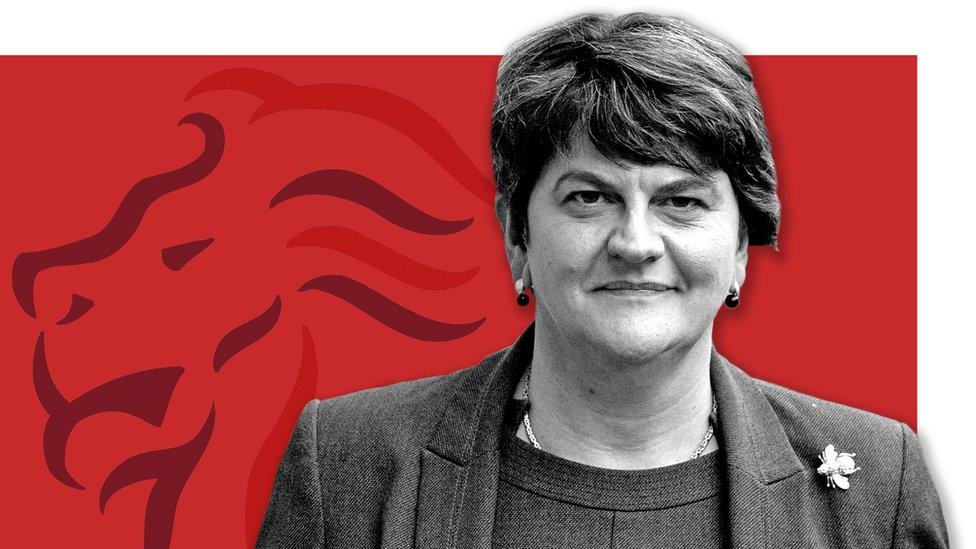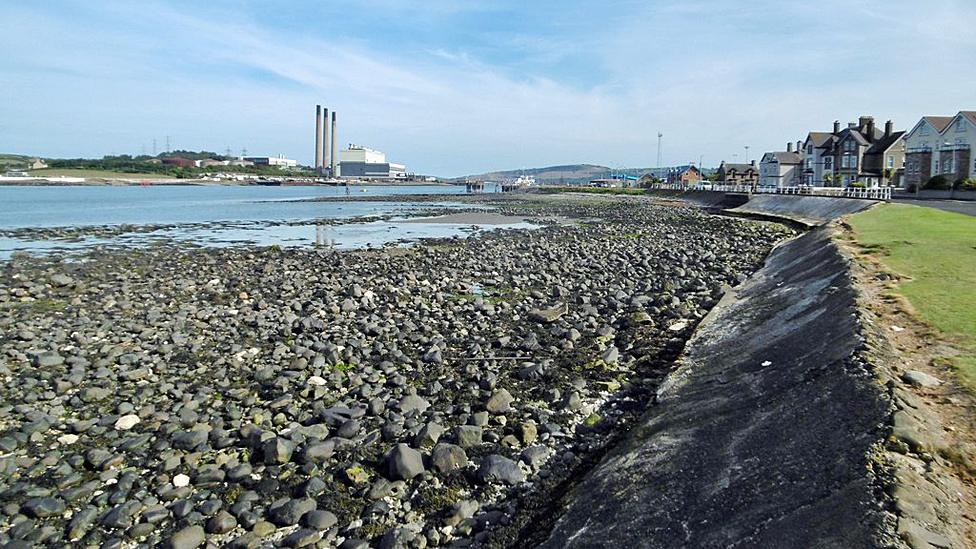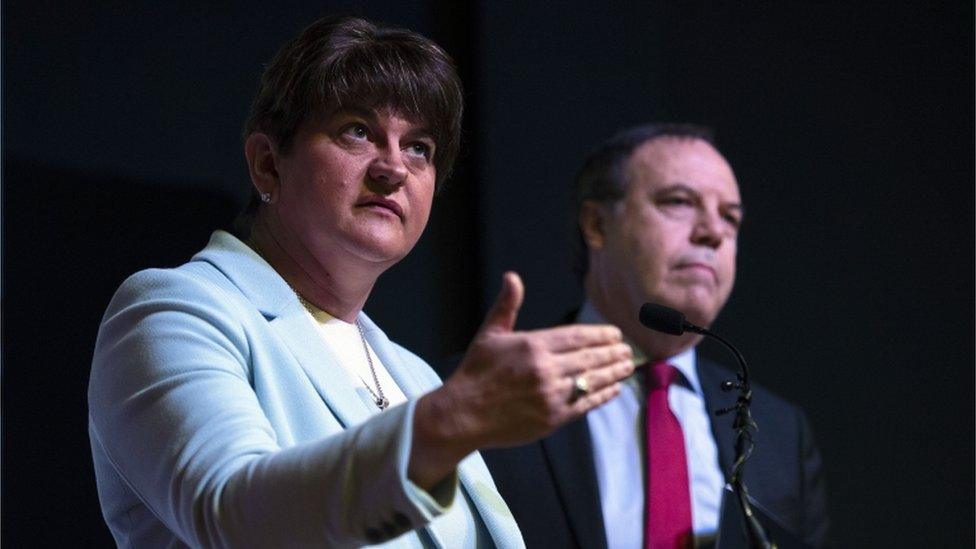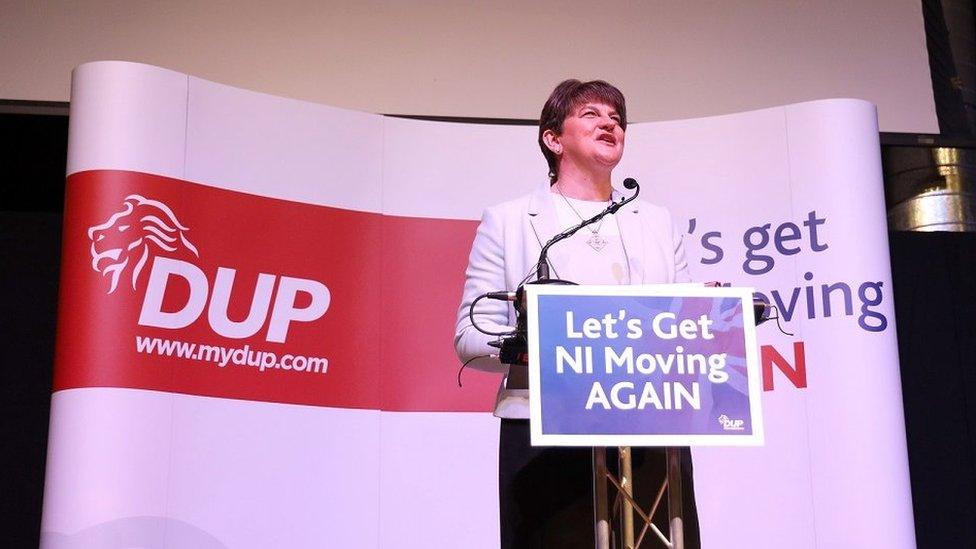Election 2019: DUP manifesto at a glance
- Published

The Democratic Unionist Party (DUP) has launched its manifesto ahead of the 12 December general election.
The full document, which you can see here, external, sets out the policies the party would support becoming law if its MPs are returned to Westminster.
Some areas, such as education or health, are devolved to the Northern Ireland Assembly, which has been suspended since January 2017.
This means the Stormont executive would need to be restored, with assembly members supporting the particular policy, before it could be introduced.
The manifesto also sets out how the DUP wants to see devolved government restored.
The main policies from the party's 2019 manifesto are:
Leaving the EU as one United Kingdom, with no border in the Irish Sea
A 12-point plan to "get Northern Ireland moving again"
Infrastructure investment that delivers for the whole UK
Keeping Jeremy Corbyn out of Downing Street
Brexit
There are no surprises when it comes to the DUP's position on Brexit.
The Leave-supporting party is standing by its long-established red lines:
The UK must leave the EU as one country, with no border in the Irish Sea
There must be unfettered access for Northern Ireland to and from the Great Britain market
Work towards a Brexit deal in Northern Ireland's interests


The DUP campaigned in favour of Brexit in 2016, but now fiercely opposes Boris Johnson's deal, arguing it will not take the UK out of the EU as one undivided nation.
If Mr Johnson is the next prime minister, the DUP wants him to change aspects of his deal regarding customs and democratic consent.
The party was willing to concede different food and animal health regulations for Northern Ireland, but only if unionists could veto anything they opposed.
However the DUP rejects the proposal that Northern Ireland will have to follow many EU rules on goods, that there will be some checks on trade between Northern Ireland and Great Britain, and that this arrangement can only be ended by a majority vote.
Instead they want the EU deal - like other contentious matters at the Stormont assembly - to require the parallel approval of both unionists and nationalists.
Unlike some other unionists, the DUP won't concede that Brexit has destabilised the UK, and its leaders don't talk about switching to Remain.
Instead, they insist it is the way Brexit has been dealt with which has been damaging: The party wants an inquiry to be set up into the handling of the UK government's Brexit negotiations.

Tax and benefits
The DUP is often thought of as a right-wing party, but while this is true on many social issues, it does not extend to the party's economic policies.
Raising the living wage, free TV licences for pensioners and an end to the freeze on benefits all feature in the manifesto.
The DUP has always made much of being supportive of older people and this election is no different.
The personal tax allowance should rise in line with inflation each year
Raise the national living wage to £10.50 by the end of the parliamentary term
End the freeze on benefits, which should rise in line with inflation
Abolish the television licence fee but restore free licences for over-75s as long as it remains
Retain the pensions triple lock and retain winter fuel payments
Infrastructure
The infamous bridge from Northern Ireland to Scotland makes an appearance in the manifesto. It has been mooted on a number of occasions, despite a number of potential barriers to its construction.
Not everyone believes those barriers are insurmountable, though.
The party also supports the expansion of Heathrow, a policy at least partly linked to the airport's dozens of flights a week to Belfast which bring with them trade and tourism.
Cancel the planned high-speed railway line from London to Birmingham and to Manchester and Leeds (HS2)
Build a third runway at Heathrow Airport
Expand the public transport bus fleet and shift it away from diesel to alternative energy
If the feasibility study on a bridge connecting Northern Ireland and Scotland is positive, it should be pursued by Westminster and devolved governments
A 1,000km long electricity interconnector from Iceland to make landfall in Northern Ireland

Larne has been suggested as one end of the huge bridge construction project
Environment and climate
If the DUP makes much of its support for the elderly, it also sees itself as a champion of farmers, fishermen and those who work in the rural economy which makes up much of Northern Ireland.
Once again the party backs financial support for farmers and it casts an eye towards the role of the rural economy after Brexit.
There is also some detail on climate change, an issue which has become a bigger focus for voters recently.
Increase financial support for farmers
Ensure agriculture is afforded protection in post-Brexit trade deals
A new fisheries bill for the UK to take back control of our territorial waters
Meet the net zero carbon neutral target for Northern Ireland by 2050
Ban all new petrol and diesel car sales by 2035

Arlene Foster says DUP votes could well still be crucial to the next government
Devolution and the Stormont deadlock
Getting Northern Ireland's stalled assembly back up and running is a key priority for the party, which says it has no preconditions for going back government with its former power-sharing partner Sinn Féin:
Work with other parties to secure a balanced deal and remain willing to set up an executive immediately
Far-reaching reform of any new assembly
Bring forward legislation to address culture and language issues within a time-limited period to be agreed alongside parallel talks


The DUP's handling of a green energy financial scandal was what sparked the political fallout that brought down devolution in January 2017.
Since then, there's been a fresh assembly election - which saw the DUP's majority in Stormont reduced - and several failed talks processes.
The DUP insists it would go back into a power-sharing government tomorrow, without preconditions - and that outstanding issues such as legislating for an Irish Language Act should be addressed alongside a functioning government.
But that idea has been rejected time and again by Sinn Féin, the largest nationalist party at Stormont and the DUP's former power-sharing partner.
It has maintained that restoring the institutions without reform will not work.
In recent weeks, there's been more conciliatory language from the DUP on language and culture - and the Northern Ireland Secretary Julian Smith has said one final round of fresh talks should be convened after the election to try and reach a breakthrough, claiming a deal is "raring to go".
What happens in this election will surely determine how the Stormont parties approach any future negotiations. Nothing can be ruled out at the moment - but the consensus is that if there's no agreement by early next year, another assembly election could be on the cards.

Defence
The DUP is a strong supporter of the military and veterans and is beefing up those credentials with a commitment to increase the percentage of GDP spent on defence.
Its other key policies on defence are long-standing:
Spend 2.2% of UK GDP on defence every year
Fully implement the Armed Forces Covenant across the UK
Maintain an independent nuclear deterrent
Other notable policies
Repeal the Fixed Term Parliaments Act
Cabinet to meet in Belfast once a year
Reform the House of Lords, including electing two-thirds of its members
A Royal Commission to produce proposals for supporting and sustaining a modern social care system
Develop a points-based immigration system

CONFUSED? A simple election guide
POLICY GUIDE: Who should I vote for?, external
REGISTER: What you need to do to vote

What are the parties promising you?
Here's a guide to where the the other main parties in Northern Ireland stand on key issues in this election campaign.
- Published28 November 2019
